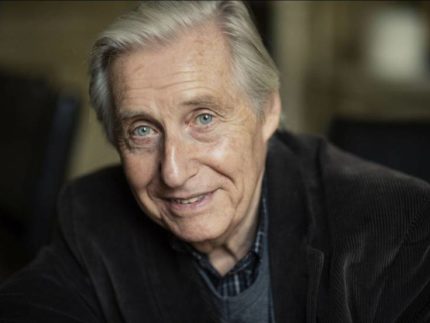Pianist Achúcarro, at 90, shows a master’s subtle artistry on farewell tour

Joaquín Achúcarro is celebrating his 90th birthday with a farewell tour. The Spanish pianist has played on the world’s concert stages for over six decades and worked with generations of major artists and conductors.
On Saturday night the North Shore Chamber Music Festival, in collaboration with the Joaquín Achúcarro Foundation, presented the pianist in recital at PianoForte Chicago. (Pianist Angela Yoffe and violinist Vadim Gluzman, the festival’s married directors, were students of Achúcarro at Southern Methodist University’s Meadows School of the Arts.) Viewed via livestream, an enthusiastic audience of piano aficionados greeted the venerable musician with a standing ovation and bravos rang out continually throughout the program of diverse vignettes.
Playing a Fazioli keyboard, Achúcarro opened with three Intermezzi by Brahms. He exhibited a light touch in a straightforward reading of the Andante moderato (Op. 117, no. 1). In the ensuing Andante non troppo, con molto espressivo, Achúcarro captured Brahms’ romantic impulses, playing with old-school authority. There was winning charm in his distinctive account of the Andante teneramente (Op. 118, no. 2).
Turning to Liszt, the Valse Oubliée No. 1 was rendered with lilting charm. Achúcarro’s technique is largely intact and he handled the score’s hand-crossings and rapid runs adroitly. He could make the piano sing for the familiar Liebestraum No. 3, substituting a measure of lyricism for Lisztian bombast. In introducing Granados’ “La Maja y el ruiseñor” (The Maiden and the Nightingale) from Goyescas, Achúcarro noted that the piece is dedicated to the composer’s wife Amparo. He related how they both drowned when the ship that they were taking back from America was hit by a German torpedo off the coast of England during World War I.
His performance was in no way anticlimactic after that gripping tale. Taking a slightly slower tempo than some pianists, Acúcarro conjured up the music’s languid atmosphere. In El Puerto” from Iberia by Albéniz, his nimble fingerwork and idiomatic flair characterized the Spanish dance rhythms.
Works by Rachmaninoff and Scriabin brought out the pianist’s virtuosic and volatile sides. The pianist’s uniquely personal delicacy of sonority and even patterns in the Prelude in G Major, Op. 23, no. 10 opened the Rachmaninoff group. There was patrician sweep in the Prelude in G-sharp minor, Op. 33, no. 12 the initial arpeggiated runs beautifully conveyed. While the Prelude in C-sharp minor, Op. 3, no. 2 may be one of the most overplayed pieces in the repertoire, Achúcarro blew away the cobwebs of routine, conveying drama without undue heaviness.
His Scriabin choices were etudes from the heady final burst of Russian romanticism before Prokofiev, Shostakovich and Scriabin himself changed the country’s musical aesthetic. There was beauty of tone and controlled rhapsodic intensity in the C-sharp minor Etude, Op. 2, no. 1. Speed and blistering power propelled the Etude pathetique, Op. 8, no. 12. Achúcarro’s playing showed total identification with Scriabin’s distinctive voice.
The audience’s cheers brought him back for an encore that is rarely played or heard. Scriabin’s Nocturne for left hand is a flowing, brightly lit reverie. Even playing with one hand, the veteran pianist showed that he still has the touch and musicianship to make the music breathe and take wing.
As Joaquín Achúcarro concludes a distinguished performing career, he leaves a legacy of memorable concerts and recordings as well as that of an important pedagogue and mentor of young pianists.
Lawrence Budmen is the Miami critic for South Florida Classical Review.
Posted in Performances




